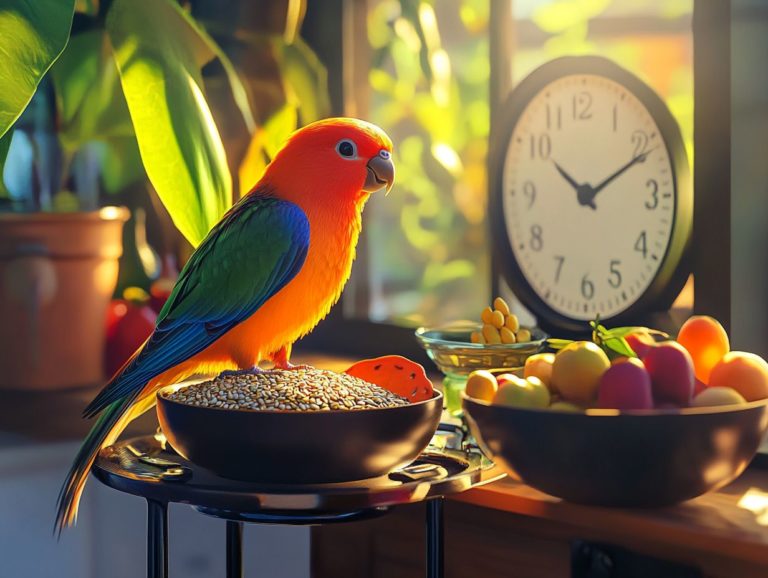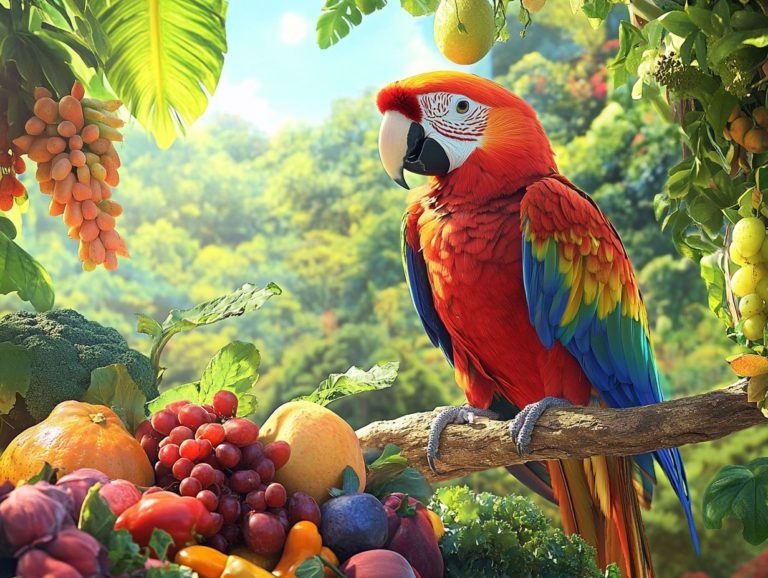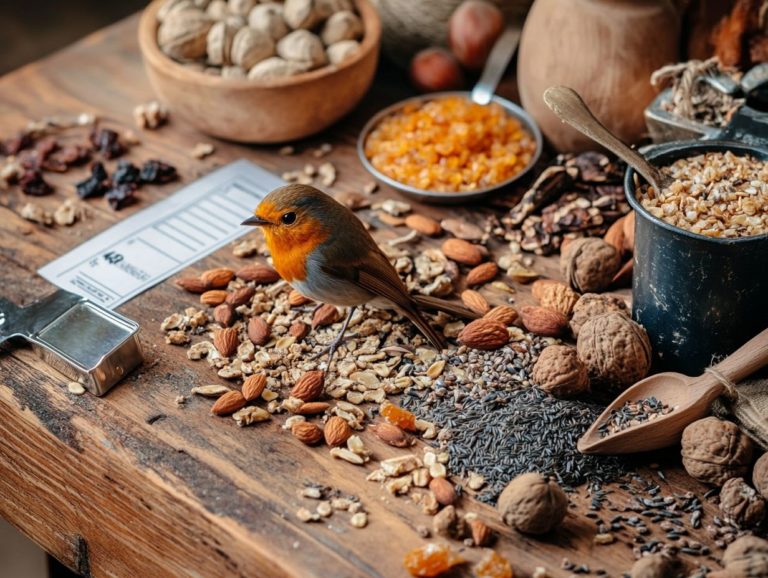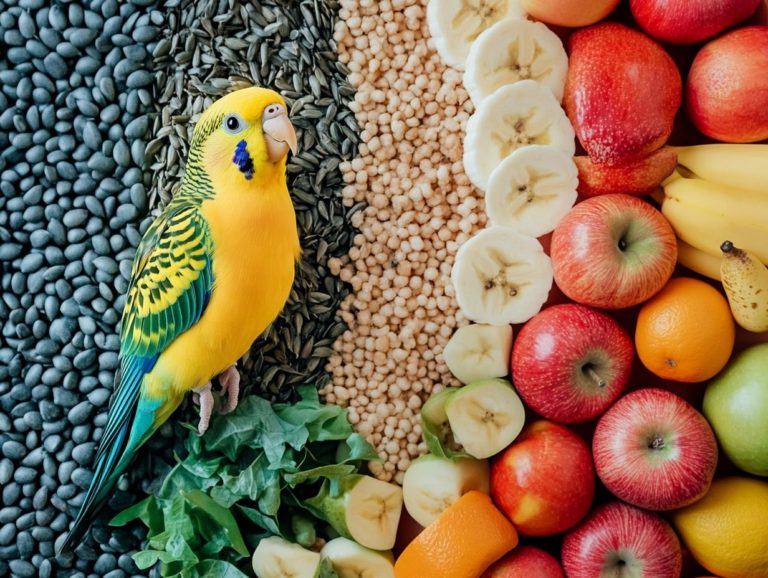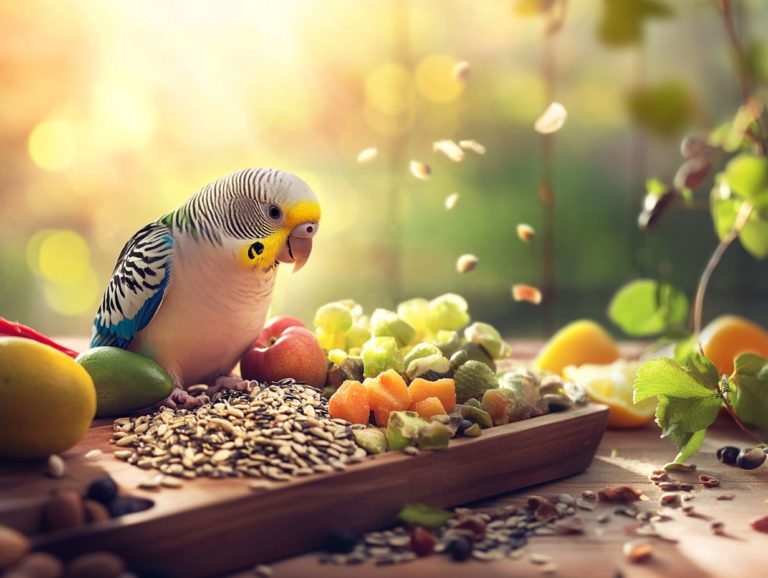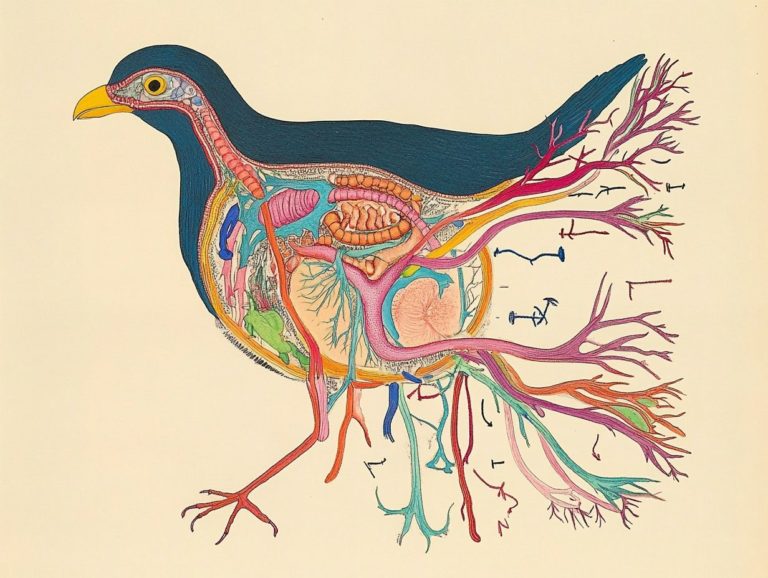A Comprehensive Guide to Bird Nutrition
To help your feathered friends thrive, you need to understand the role of proper nutrition. Providing the best pet bird food is essential.
Like humans, birds also need a balanced diet. This diet should include proteins, carbohydrates, fats, vitamins, and minerals, along with high-quality pellets and fresh fruits.
This guide delves into common nutritional deficiencies, highlighting signs to look out for and tailored feeding strategies suited to various species. This ensures optimal care and wellness.
You ll discover the significance of supplements, including foods high in omega fatty acids, which are good for heart health. Additionally, you will find sample meal plans to keep your birds flourishing.
Join us and discover the secrets to keeping your birds healthy and happy!
Contents
- Key Takeaways:
- Nutrients Essential for Birds and Their Health
- Proteins, Carbohydrates, Fats, Vitamins, and Minerals
- Common Nutritional Deficiencies in Birds
- Feeding Your Bird
- Special Considerations for Different Types of Birds and Their Nutritional Needs
- Supplements for Bird Nutrition
- Creating a Balanced Diet for Your Bird
- Frequently Asked Questions
Key Takeaways:
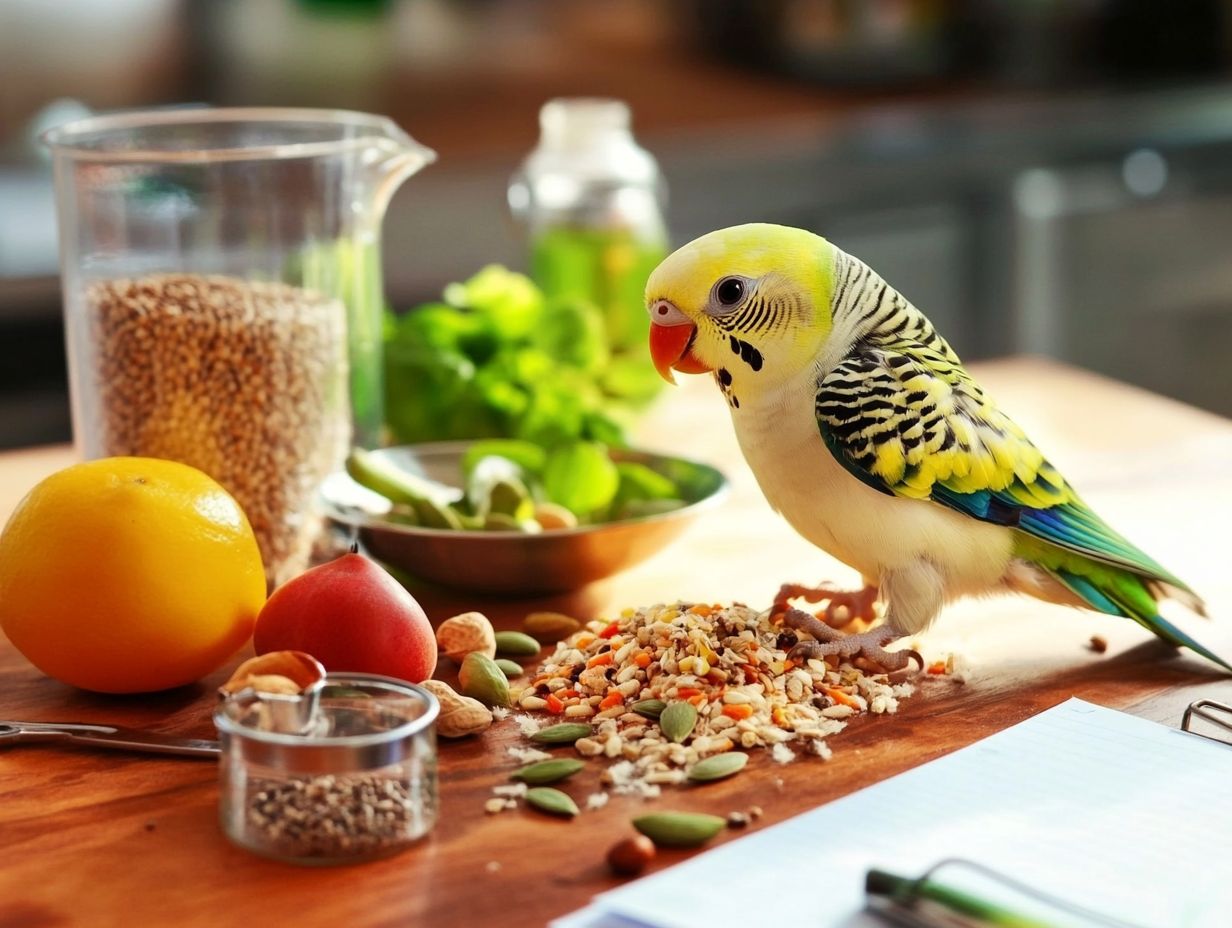
Proper nutrition is key to your birds health and happiness!
Essential nutrients like proteins, carbohydrates, fats, vitamins, and minerals are vital for birds. A deficiency can lead to various health issues.
Feeding a balanced and varied diet rich in delicious nuts, fruits, and vegetables, along with appropriate supplements, ensures optimal nutrition for birds of all species. For those specifically caring for lovebirds, understanding lovebird nutrition is essential.
Why Proper Nutrition is Important for Birds
Proper nutrition is vital for your birds’ health and well-being. For finches specifically, following finch feeding guidelines directly influences their energy levels, immune systems, and overall vitality.
A balanced diet, customized to your bird’s species, enhances their physical condition, extends their lifespan, and significantly improves their quality of life.
By understanding their nutritional needs, you can provide the best possible care. This includes offering a delightful array of fresh foods, such as pellets, nuts, fruits, and vegetables each rich in vitamins, minerals, and proteins essential for optimal health.
When you prioritize proper nutrition, you lay the groundwork for vibrant plumage, agility, and positive social behavior. To ensure your pet bird thrives, it’s important to follow best practices for bird nutrition. For example, larger birds like macaws might require a higher intake of fatty seeds and fruits.
Smaller species, such as budgerigars, thrive on high-quality pellets paired with fresh greens. Supplementing with calcium-rich foods can help prevent bone density issues, especially in laying hens.
It’s equally important to monitor portion sizes and avoid excessive sugary or fatty snacks. These can lead to obesity and related health concerns.
Adopting a conscientious approach to your birds diet not only fosters better physical health but also nurtures happier, more interactive companions. This creates a harmonious environment for both you and your birds.
Nutrients Essential for Birds and Their Health
Birds thrive on a diverse array of essential nutrients, including proteins, vitamins, and minerals. Each contributes significantly to their overall health and energy.
A well-rounded diet supports their physical growth and fortifies their immune system, enabling them to effectively ward off diseases.
By incorporating a mix of fresh foods, such as fruits, vegetables, and premium pellets, you can craft a balanced diet tailored to your pet’s unique nutritional needs.
This thoughtful approach will undoubtedly lead to a happier and healthier life for your feathered companion.
Proteins, Carbohydrates, Fats, Vitamins, and Minerals
A bird’s diet deserves your careful attention. It should include a mix of proteins, carbohydrates, fats, vitamins, and minerals for their health and vitality.
Think of proteins as the building blocks for growth and tissue repair. Carbohydrates serve as the engine fueling daily activities.
Healthy fats support essential cellular functions when included in moderation. Vitamins and minerals from foods like nuts, seeds, and pellets enhance the immune system and overall wellbeing.
You can provide proteins from sources like cooked eggs or legumes. These are fantastic for muscle development.
Carbohydrates from whole grains, such as brown rice or quinoa, supply energy to keep your birds active.
For healthy fats, consider nuts like almonds and walnuts. These offer essential fatty acids for vibrant skin and feathers.
Meanwhile, vegetables like broccoli are rich in vitamins and minerals, significantly enhancing the immune response.
By incorporating a diverse range of food types, including tasty seeds like sunflower seeds and millet, you can feed your feathered friends well and watch them thrive!
Common Nutritional Deficiencies in Birds
Common nutritional deficiencies in birds can lead to various health challenges and affect their overall wellbeing. Signs like feather plucking, lethargy, or shifts in behavior often signal an imbalance in their diet.
Recognizing these indicators early allows you to adjust your pet’s nutrition, ensuring they receive the essential vitamins and minerals they need. This proactive approach promotes a healthier life and contributes to the happiness of your feathered companions.
Signs and Symptoms
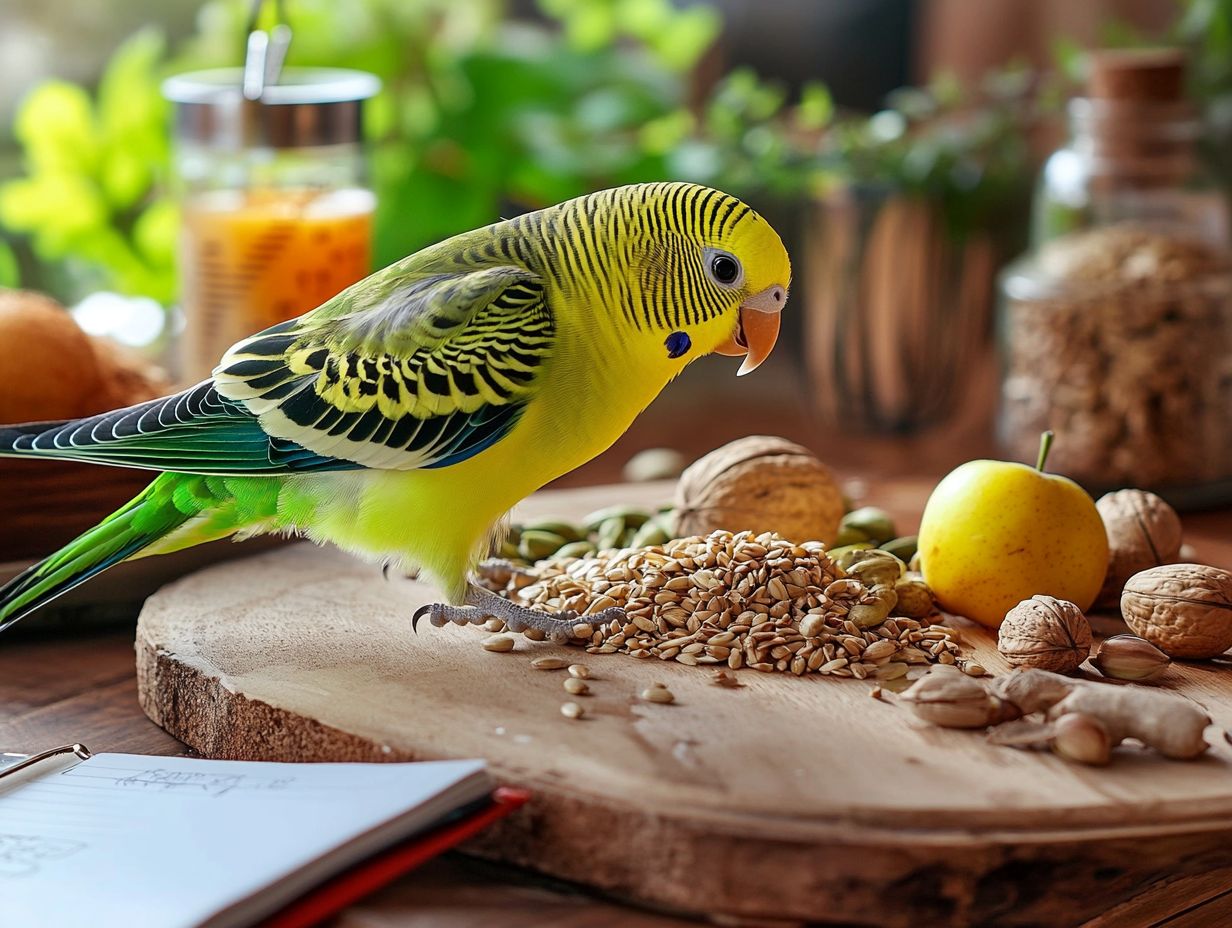
As a bird owner, you need to be attentive to the signs and symptoms that may indicate nutritional deficiencies in your feathered friends. Early detection is crucial in preventing more serious health issues.
Watch for behavioral changes like increased aggression, lethargy, or feather degradation. These can signal underlying nutritional imbalances.
By recognizing these indicators, you can take proactive measures to ensure your birds receive a balanced diet filled with essential nutrients.
Monitoring your birds’ feeding habits and considering the types of foods offered are vital strategies in this process. A sudden change in appetite or preference for specific food could suggest a deficiency.
Feather plucking or dull coloration might indicate a lack of crucial vitamins like A or E.
Consulting with avian veterinarians can help you pinpoint the best dietary options, including fortified pellets which are specially formulated to have the right nutrients alongside fresh fruits and vegetables.
Regular health check-ups will aid in identifying potential issues before they escalate. This allows you to make timely adjustments to your bird s nutritional regimen.
Feeding Your Bird
Providing your bird with a well-rounded diet rich in fresh, nutritious options is essential for its health and happiness. For those caring for young birds, knowing the best food options is crucial, as outlined in our complete guide to feeding baby birds, which can enhance its well-being.
Incorporate a diverse range of foods from top-notch pellets to tantalizing fruits and vegetables. This helps meet its nutritional needs and personal tastes.
Follow proper feeding guidelines tailored to your bird’s species, age, and health status to ensure it receives comprehensive nutrition it deserves.
Best Foods for Optimal Nutrition and Wellness
The best foods for ensuring optimal nutrition for your birds encompass a delightful array of options, including high-quality pellets, fresh fruits, nuts, and vegetables. For a comprehensive understanding, check out the balanced diet for pet birds, as each of these contributes essential nutrients that are vital for their well-being.
By incorporating foods like almonds, apples, and broccoli into your bird s meals, you can provide a rich assortment of vitamins and minerals necessary for maintaining their health. Ensuring their diet includes these items will help promote vitality and longevity in your feathered companions.
To craft a well-rounded menu, consider adding treats like cooked quinoa or chickpeas, which offer a healthy dose of protein and fiber. Introduce new foods gradually while keeping an eye on any reactions, as some birds may be more sensitive to dietary changes.
Brands such as Lafeber offer specially formulated pellets designed to meet the nutritional needs of various bird species. Mixing in fresh produce like dark leafy greens or seasonal fruits not only enhances nutrition but also adds excitement and variety to mealtime for your beloved pet birds.
Feeding Guidelines and Tips
Establishing effective feeding guidelines is essential for you as a bird owner to ensure your pets receive a balanced and nutritious diet. By offering a variety of foods and changing up the seeds while keeping an eye on portion sizes, you can significantly enhance their overall well-being.
Understanding the specific dietary needs based on your bird’s age and species is key to preventing a lack of important nutrients and fostering a happy, healthy companion.
Pay attention to the life stages of your avian friends, as their dietary requirements can vary greatly between chicks, juveniles, and adults. For example, young birds often need higher protein levels to support their growth, whereas mature birds may benefit from lower fat content to maintain a healthy weight.
Also, introduce new foods gradually to prevent digestive upset and promote acceptance. Rotate foods often and include a variety of important vitamins and minerals to ensure that your feathered companions thrive throughout their lives.
Special Considerations for Different Types of Birds and Their Nutritional Needs
It’s exciting to explore the unique needs of various species, as each one possesses its own dietary requirements. Elements such as age, health status, and natural habitat significantly shape what a balanced diet looks like for your bird.
By grasping these nuances, you can ensure that each bird receives the right nutrients, ultimately fostering better health and enhancing their overall quality of life.
Dietary Differences for Different Species
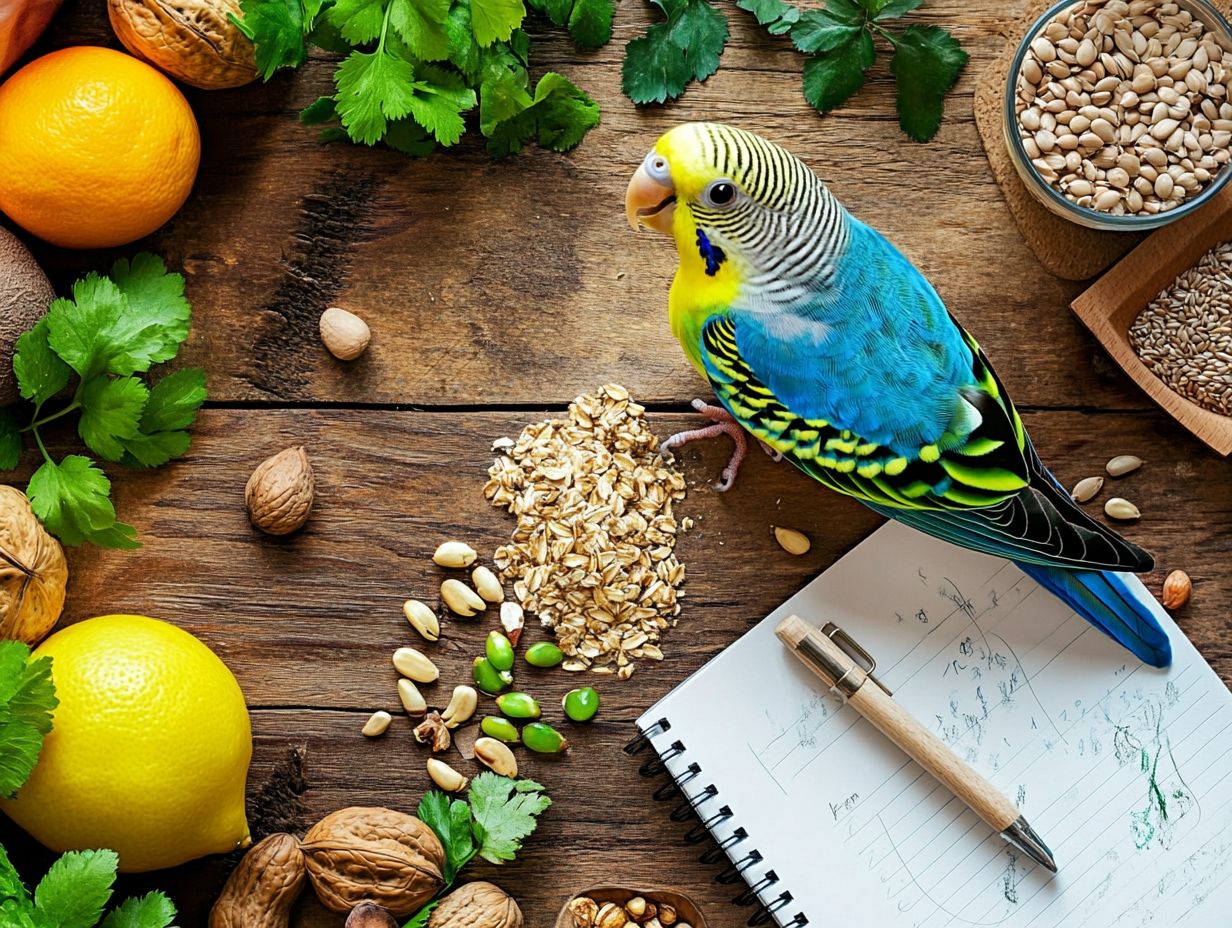
Dietary differences among bird species require you to approach feeding with thoughtfulness and precision, as each type has unique nutritional needs. For instance, while parrots might flourish on a diet brimming with fruits and nuts, finches typically thrive on a seed-based diet, supplemented with fresh vegetables.
Understanding these distinctions is vital for your birds’ health, so choose the right foods today! Canaries, for example, thrive on a balanced blend of seeds, fruits, and greens, which support their vibrant coloration and overall vitality.
On the other hand, birds of prey like hawks and owls require a protein-dense diet, consisting of whole rodents or smaller birds, to meet the essential nutrient demands of their active lifestyles.
By tailoring nutrition in this way, you not only enhance their physical health but also support their mental well-being. A varied diet mimics their natural foraging instincts, creating a nurturing and healthy environment. For more insights, refer to understanding avian health, leading to countless joyful years with your feathered companions.
Supplements for Bird Nutrition
Supplements are vital for enhancing bird nutrition. They provide essential vitamins and minerals that may be lacking in their daily diet.
Integrating premium supplements into your feeding routine can boost your bird s health and well-being.
When and How to Use Supplements
Knowing when and how to add supplements to a bird’s diet is key. They are especially useful during growth spurts, illness, or stress.
Follow dosage guidelines closely, and consult a veterinarian for the best options tailored to your bird s needs.
Beyond basic vitamins, probiotics can improve digestion, while omega-3 fatty acids benefit feather condition. Administer these during or after meals for better absorption.
Consider your bird’s species, age, and health issues when determining the right dosage.
Working with a veterinarian ensures the supplement plan suits your bird, paving the way for optimal health and longevity.
Creating a Balanced Diet for Your Bird
A balanced diet is essential for your bird’s health, and knowing how to create a bird-friendly diet plan ensures that all nutritional needs are met through various food sources.
Incorporate high-quality pellets, fresh fruits, veggies, and occasional treats for vital vitamins, minerals, and protein.
Sample Meal Plans and Recipes
Sample meal plans are invaluable for bird owners. They help provide a balanced diet filled with nutrients.
Include pellets, fresh fruits like mangoes and berries, and veggies like carrots and kale for a rich nutrient mix.
Offering a variety of foods not only enhances flavor but also supports your pet’s well-being. For example, parrots enjoy seeds with greens, while canaries thrive on millets and veggies.
Experimenting with different textures and colors can also encourage picky eaters.
Focus on a thoughtful selection of proteins, carbohydrates, and fats tailored to each species. This approach fosters long-term health and makes meal prep enjoyable.
Frequently Asked Questions
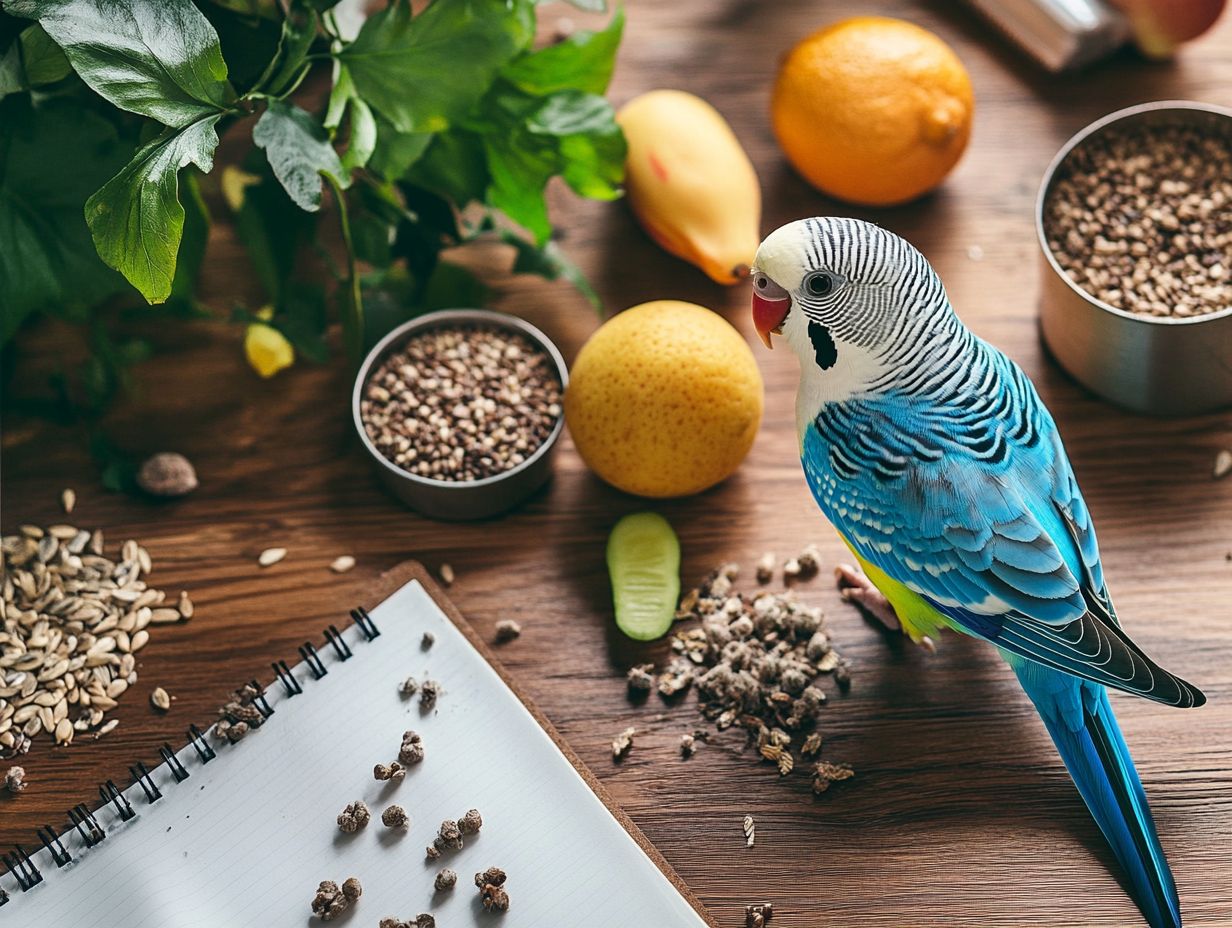
What is included in a comprehensive guide to bird nutrition?
A comprehensive guide covers essential nutrients, food types, and feeding habits for birds.
Why is proper nutrition important for birds?
Proper nutrition helps birds stay healthy, prevents diseases, and supports natural behaviors.
Can I feed my bird the same food I eat?
No, birds require different foods than humans. Human food may lack essential nutrients and could harm their health.
What are some common nutrient deficiencies in birds?
Birds often lack calcium, vitamin D, and vitamin A. These deficiencies can cause weak bones, poor feather quality, and vision problems.
How often should I feed my bird?
The frequency of feeding depends on the bird’s species, age, and size. Small birds generally need 2-3 meals each day, while larger birds may only require 1-2 meals.
Are there any foods I should avoid feeding my bird?
Avoid foods that are toxic to birds, such as avocado, chocolate, onions, and caffeine. It’s crucial to know which foods are safe for your bird.

